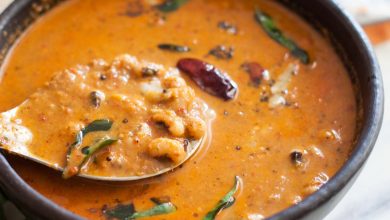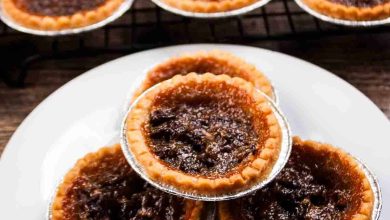Dry Jamun Recipe: A Perfect Diwali Delight
Description:
Dry Jamun, a delightful variation of the traditional Gulab Jamun, is a sweet treat that boasts a rich, golden-brown exterior and a soft, melt-in-your-mouth interior. This decadent dessert is perfect for festive occasions like Diwali. With its unique preparation of kneading khoya (mawa), paneer, and milk powder into a dough and frying it until crispy, Dry Jamun is then soaked in sugar syrup and rolled in desiccated coconut for added texture. It’s an indulgent, bite-sized dessert that brings joy to your celebrations.
Ingredients:
| Ingredient | Quantity |
|---|---|
| Crumbled Khoya (Mawa) | 300 grams |
| Grated Paneer (Homemade Cottage Cheese) | 200 grams |
| Milk Powder | 4 tablespoons |
| All Purpose Flour (Maida) | 3/4 cup |
| Cardamom Powder (Elaichi) | 1/4 teaspoon |
| Powdered Sugar | 1 tablespoon |
| Sugar (for syrup) | 1-1/2 cups |
| Water (for sugar syrup) | 1/2 cup |
| Desiccated Coconut | 1/2 cup |
| Ghee (for frying) | 2 cups |
Nutritional Information (per serving):
| Nutrient | Amount |
|---|---|
| Calories | ~230 kcal |
| Carbohydrates | ~30 g |
| Protein | ~6 g |
| Fat | ~10 g |
| Sugars | ~22 g |
| Fiber | ~1 g |
Preparation Time:
| Task | Time |
|---|---|
| Prep Time | 10 minutes |
| Cook Time | 30 minutes |
| Total Time | 40 minutes |
Instructions:
Step 1: Preparing the Sugar Syrup
- Start by making the sugar syrup.
Place a saucepan on medium heat, add 1-1/2 cups sugar and 1/2 cup water. Stir continuously until the sugar dissolves completely. Let the syrup come to a boil and cook until it reaches a one-string consistency. This process should take about 8-10 minutes. Once done, remove it from heat and set aside to cool slightly.
Step 2: Preparing the Dough for Jamuns
-
Mix the dough ingredients.
In a large bowl, combine the crumbled khoya, grated paneer, milk powder, cardamom powder, and powdered sugar. Mix thoroughly until all the ingredients are well incorporated.Related Articles -
Knead the dough.
Slowly add the maida (all-purpose flour) to the mixture, little by little. Knead it into a smooth yet firm dough. The dough should not be too soft but should hold its shape well when you form balls. If the dough feels sticky, sprinkle a little more maida until you achieve the right consistency. -
Shape the dough.
Divide the dough into small portions and roll them into smooth balls, about the size of a lemon. Set these dough balls aside on a tray.
Step 3: Frying the Jamun Balls
-
Heat the ghee.
Heat the ghee in a deep pan over medium heat. Once the ghee is hot, carefully add the jamun balls in batches. Do not overcrowd the pan. Fry the balls, stirring gently, to ensure they cook evenly and do not stick to the bottom. Fry until they turn a beautiful golden brown color, which should take around 6-8 minutes. -
Remove the fried jamuns.
Once golden and crispy, remove the jamuns from the ghee and drain on paper towels to remove excess oil.
Step 4: Soaking and Coating
-
Soak in sugar syrup.
Immediately drop the fried jamun balls into the prepared sugar syrup. Let them soak in the syrup for 5-7 minutes, ensuring that they absorb the syrup fully and become soft and moist. -
Coat with desiccated coconut.
After soaking, place the jamun balls on a plate. Spread the desiccated coconut evenly on a flat surface and roll each jamun ball in the coconut until it is fully coated. This adds a delightful crunch and flavor to the dessert.
Serving:
Once all the jamuns are coated in coconut, transfer them to a serving dish. Dry Jamun can be enjoyed warm or at room temperature, making it a versatile treat for your Diwali celebrations or any festive occasion. Pair it with Sindhi Pulao, Paneer Makhani, and Tomato Onion Cucumber Raita for a complete meal experience.
Tips for Best Results:
- Khoya and Paneer: Be sure to use fresh khoya and paneer for the best texture and flavor. Homemade paneer will provide a creamier texture compared to store-bought options.
- Consistent Frying: When frying, keep the ghee at a medium temperature. If the ghee is too hot, the jamuns will brown too quickly on the outside while remaining uncooked on the inside.
- Sugar Syrup Consistency: The sugar syrup should be of one-string consistency. If it is too thin, the jamuns may not soak up enough syrup; if too thick, they will become overly sugary.
Enjoy this decadent Dry Jamun recipe as a festive treat! Whether for Diwali or any special occasion, this sweet delight is sure to impress your family and guests.




